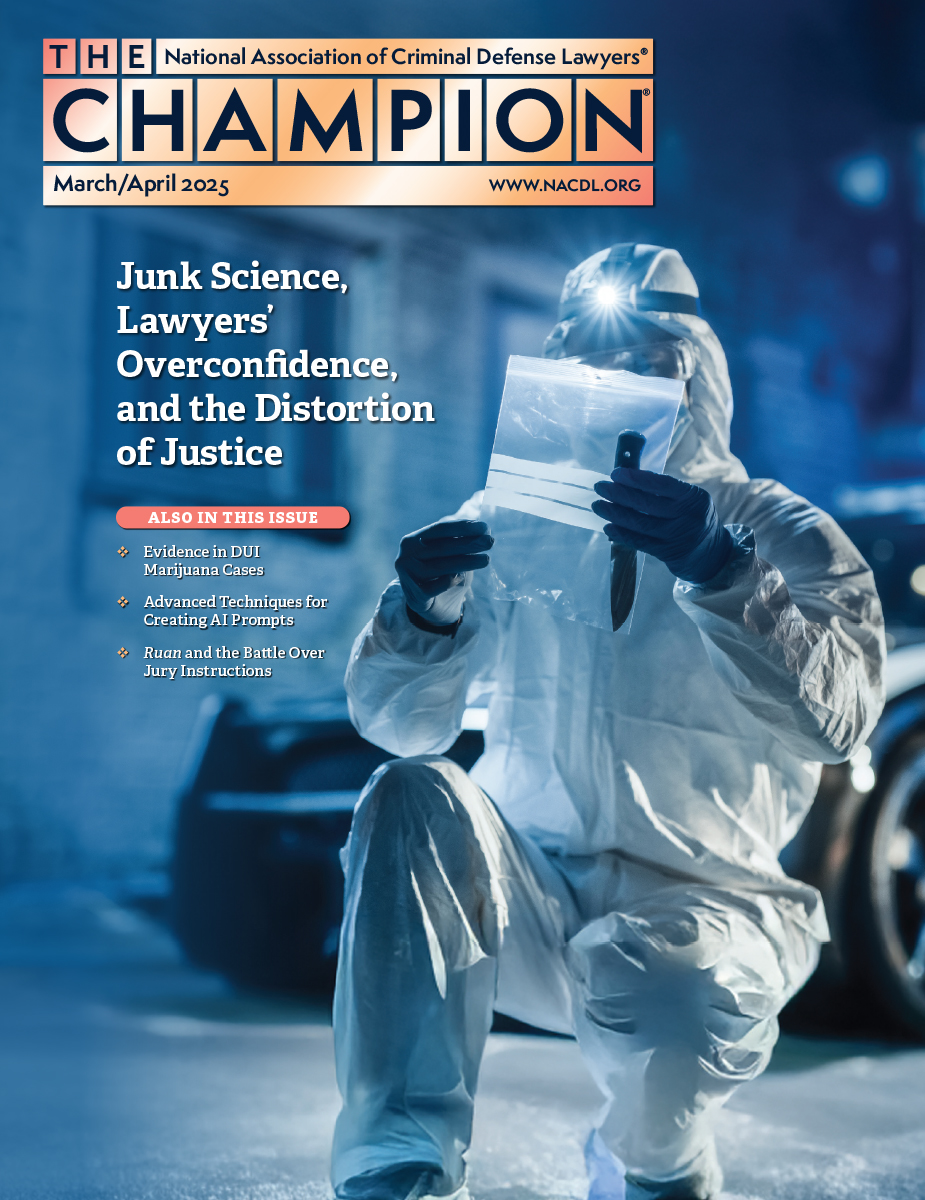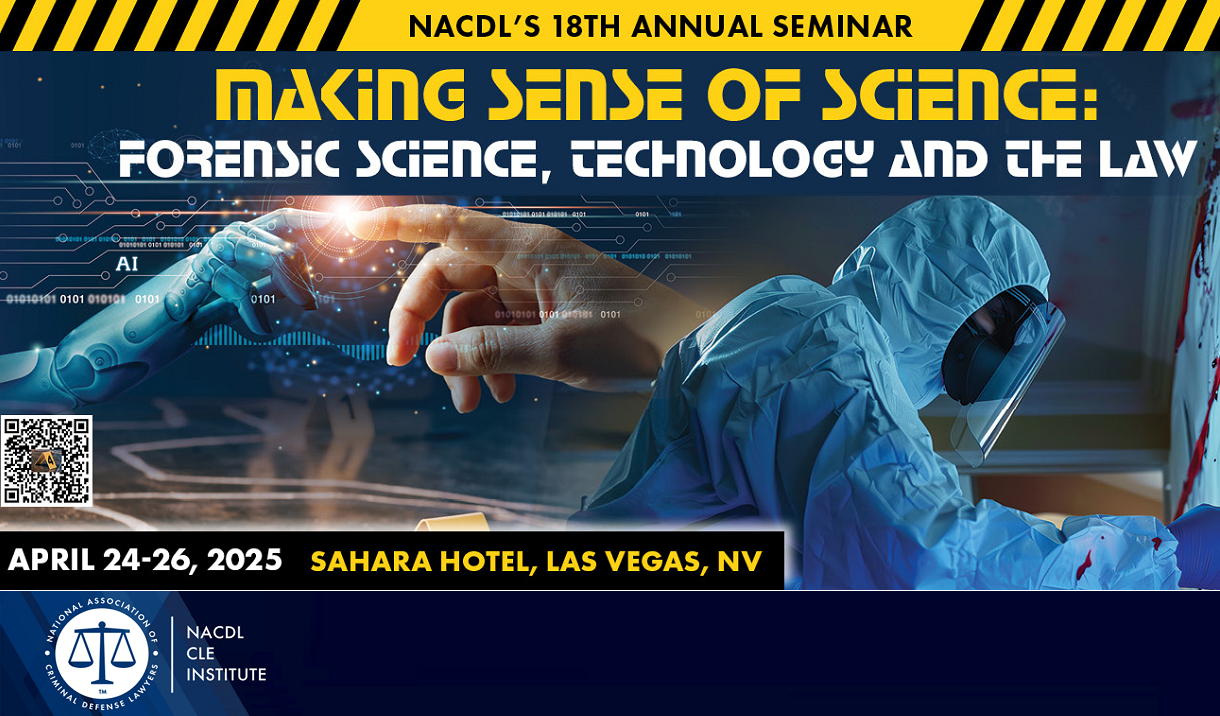Joint Statement: COVID-19 Vaccine Distribution and the American Criminal Legal and Detention Systems
As policymakers develop COVID-19 vaccine distribution plans, the National Association of Criminal Defense Lawyers (NACDL), the Association of Prosecuting Attorneys (APA), and the Center for HIV Law & Policy (CHLP), recognizing the essential nature of the criminal legal system to society, call for all actors within that system, including all individuals living and working in the nation’s jails, prisons, and other detention facilities, to be prioritized in the COVID-19 vaccination process.
In May 2020, a group of national organizations, including NACDL, APA, and CHLP released a set of principles for incorporating public health approaches into the criminal legal system’s response to COVID-19 -- Proposed Public Health and Public Safety Pathways for Criminal Justice System Responses to COVID-19.[i] Foremost among the principles espoused by these stakeholders was to immediately decrease the population of incarcerated individuals to limit the spread of the disease within jails, prisons, and other detention facilities to protect people in those facilities and the communities around them. In addition, the principles called for building and maintaining connections among public health organizations, researchers, and criminal justice stakeholders. And in June 2020, NACDL released a report -- Criminal Court Reopening and Public Health in the COVID-19 Era – emphasizing that in its view jury trials are not safe until the COVID-19 pandemic is under control.[ii]
As of early December 2020, the COVID-19 pandemic has devastated the United States. Nearly 270,000 Americans have died as a result of the virus, hundreds of thousands more have suffered long-term hospitalizations, and nearly everyone has endured the consequences of isolation, personal and economic loss, and disruption of normal life. The pandemic has also forced a pause in the functioning of large swaths of the nation’s criminal legal system.
To date, as many as three major pharmaceutical companies and the government are preparing to roll out vaccines to immunize and protect people from COVID-19. The following principles must be considered as policymakers determine priority populations for vaccine distribution.
Principle One:
A criminal legal system must be fully functioning to protect all members of society.
Criminal legal system workers are essential, and a fully functioning criminal legal system is critical to safeguard the rights of accused and detained persons and to provide redress for victims of criminal conduct. A fully functioning criminal legal process is essential for the well-being of society and delays in the process create huge costs for all involved including victims, people in detention, and taxpayers who foot the bills. The COVID-19 pandemic has strained the criminal legal system by creating an inherent conflict between public safety and core constitutional rights that is unique in our lifetimes. COVID-19 is a highly infectious and potentially deadly disease and spreads most aggressively when people are in close proximity in enclosed spaces for extended periods. This has made business as usual in the nation’s courthouses impossible, and will continue to do so absent prompt, universal vaccination of all system stakeholders. Indeed, as the virus has undergone its third surge in the United States beginning in late September, there has been a renewed wave of court closures.[iii]
Principle Two:
Public health priorities must recognize the rights of those accused of criminal conduct and the need of survivors of crime for resolution and closure.
As NACDL acknowledged in its June 2020 report -- Criminal Court Reopening and Public Health in the COVID-19 Era – due to the high risk of transmission of the coronavirus, the right of an accused person to a speedy trial had to take a backseat to public health concerns.[iv] As explained in that report:
The COVID-19 pandemic presents unprecedented health risks in every aspect of public life. These unprecedented public health risks pose enormous challenges for court operations especially in criminal matters where the accused, presumed innocent, are often subjected to pre-trial detention in crowded and unsanitary conditions. According to infectious disease experts, these deadly risks are maximized when human beings are in close proximity, not only in pre-trial detention, but in the conditions and activities common to courthouses across the country – enclosed spaces requiring close proximity for extended periods. In-person court proceedings pose serious risks to every human being involved directly in the proceedings and to their families and communities – risks which public health experts recognize to be greater for specific communities including people of color.[v]
If policymakers ensure the prompt vaccination of all criminal legal system actors, the coming availability of COVID-19 vaccines offers the opportunity to reopen the system, reduce the clear and present danger faced by the more than two million individuals in the nation’s detention facilities, and begin the work of restoring speedy trial rights, among others, and reducing the massive backlog owing to the pandemic that has left the general public and affected individuals awaiting remedy, resolution, and closure of matters pending before the courts.
Principle Three:
Vaccine distribution must prioritize all stakeholders in the criminal legal system – including judges; prosecutors; defense counsel; defendants; victims; witnesses; jurors; courthouse staff, interpreters, and other contract workers; and jail, prison, and detention facility populations, staff, and contractors – and ensure their vaccination prior to the resumption of normal operations.
Actors within the criminal legal system are essential because public safety, liberty, and justice cannot be protected unless the system provides opportunities to resolve cases. Without supplying vaccinations to all of these stakeholders, the criminal courts cannot resume normal operations. The proper and constitutional functioning of the American criminal legal system depends upon these essential actors coming together in enclosed spaces for prolonged periods of time, a high-risk proposition in the absence of a vaccine or other mechanism to bring the pandemic under control.
As to those summoned as witnesses or jurors in any proceeding, if not already effectively vaccinated, any such notice, summons, or subpoena must operate as a ticket to provide access to prompt vaccination with sufficient lead time to ensure immunity prior to reporting to the courthouse.
Additionally, because holding cells, local jails, and prisons may by design lack opportunities for proper social distancing, a number of these facilities have already experienced high numbers of COVID-19 cases among both staff and inmates. All those who must support detention facilities, including court officers, detention officers, support staff, and vendors can both introduce the virus into these facilities as well as transmit it to their communities. As a matter of public health and ethical responsibility, both detainee populations and those who are responsible for their care and management should have priority access to COVID-19 vaccination.
Conclusion
Prioritizing vaccination for all criminal legal system actors is the most effective way for the American criminal legal system, including its detention system, to return to normal and safe operation, to safeguard fundamental rights, and to prevent community spread from the personal interactions necessary for that system to function as the Constitution requires.
[i] APA, NACDL, CHLP, Community Oriented Correctional Health Services, The Williams Institute at UCLA, and UCLA School of Law’s Criminal Justice Program, the National Alliance of State and Territorial AIDS Directors, the National Legal Aid & Defender Association, Columbia Justice Lab, and the Fenway Institute, Proposed Public Health and Public Safety Pathways for Criminal Justice System Responses to COVID-19 (May 2020), available at https://www.nacdl.org/Document/JointStatementCriminalJusticeResponsetoCOVID19.
[ii] NACDL, Criminal Court Reopening and Public Health in the COVID-19 Era (June 2020), available at https://www.nacdl.org/Document/CriminalCourtReopeningAndCOVID-19.
[iii] Madison Adler & Allie Reed, U.S. Courts Close Doors, Cancel Juries as Virus Surges, BLOOMBERG LAW, Nov. 20, 2020, available at https://news.bloomberglaw.com/us-law-week/u-s-courts-close-doors-cancel-juries-as-virus-surges (“Courts across the U.S. are shutting their doors again due to rising Covid-19 cases, including several that had outbreaks inside their courthouses. State and federal courts—including those in Texas, New York, Maryland, New Mexico, and Illinois—have suspended jury trials in the past few weeks as a result of spikes in Covid-19 infections.”).
[iv] See supra note ii.
[v] Id. at 3.












